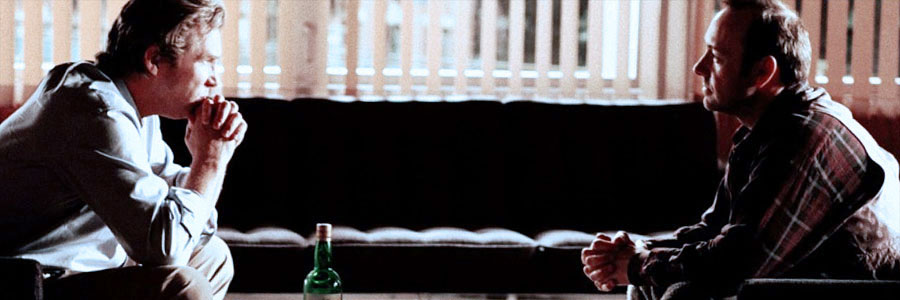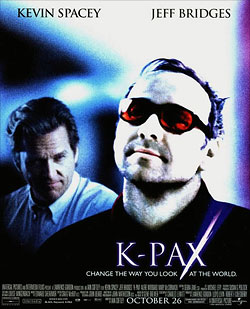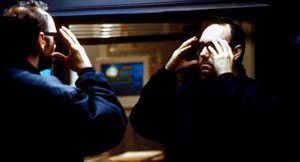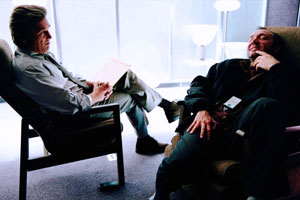
K-PAX

K-PAX (MOVIE)
Universal Pictures
Original release: April 12th, 2002
Running time: 120 minutes
Director: Iain Softley
Writers: Charles Leavitt (screenplay), Gene Brewer (novel)
Soundtrack: “Rocket Man” by Elton John
Cast: Kevin Spacey, Jeff Bridges, Mary McCormack

Anything is possible. Deep in our hearts and minds, we know there are things unlikely, improbable, implausible… but not impossible.
Have you ever asked yourself if you’ve built up a veneer of all-knowingness that has become all too impenetrable? Out of your shell of certainties, have you ever looked in the mirror and wondered if there’s a vestige of insanity looking back at you because you feel you’re losing your sense of wonder?
Ten years ago, it was more than a little out there to think the Milky Way is home to countless planets like or similar to Earth. Now this idea is turning into knowledge, and I wonder how long it will be before we discover life beyond Earth is anything but an exception.
Having said that, a film like K-Pax emanates a kind of charming naiveté. On the other hand, the movie was surely underrated and misunderstood at the time of its release 10 years ago — the same way more contemporary “out-there” stories are being underrated and misunderstood today. K-Pax‘ strong references to Jesus Christ and a world view that looks at family and the miracles of healing from a uniquely spiritual and at the same time down-to-earth vantage point have been taunted or simply ignored to this day.
Kevin Spacey portrays an innocuous man named Prot who seemingly appears out of nowhere at Grand Central Station in New York City and is detained in the aftermath of a mugging. The police turn Prot over to psychiatrist Dr. Mark Powell (Jeff Bridges) after he tells them the light on Earth is too bright for him — much brighter than on his distant home planet K-PAX.
Dr. Powell has treated many delusionals in his career and figures he’ll quickly get to the bottom of Prot’s story. It turns out the man is not at all the text-book delusional, mentally and physically. His blood pressure is unusually volatile, he doesn’t seem to respond to medication whatsoever, and he has the ability to see ultraviolet light.

Describing his cosmic travels to Powell, Prot not only re-interprets Einstein’s theories about the speed of light but also confounds a group of sceptical astrophysicists with his knowledge (a reminiscence to Jesus addressing the elder people in the temple). In Prot’s terms, Earth — a “class BA-III planet” — is at the stage of early evolution with an uncertain future.
In 2012, our future may seem more uncertain than it did ten years ago. Prot’s insights and advice make him look extremely smart and normal. It seems his only “abnormality” is his claim about Earth not being his home planet but in the greater scheme of things that’s almost negligible.
Ultimately, Prot transforms into his shrink’s Alter Ego, dissecting the doctor’s family life with analytical precision. At first, “family” is a truly alien concept to Prot, a universal “non sequitur”. On K-PAX, he says, children are brought up by many people and become genuinely independent personalities, making any connection to their birth parents meaningless.
In his psychiatrist’s life, family is not what it seems either. Dr. Powell and his son don’t talk, there’s a crack in the family, even if virtually impalpable, one  that has little to do with Powell being the typical workaholic at a metropolitan psych ward.
that has little to do with Powell being the typical workaholic at a metropolitan psych ward.
The encounter of the two men becomes a cathartic experience for both. Powell begins to question the truths of his life, and Prot realises that the human soul can’t survive without a connection to others. When he announces his return to K-PAX, Prot realises he will be missed — this is entirely new to him. In his world “nobody needs, nobody wants”.
Nonetheless, his descriptions of the life on a far away planet trigger an awakening among the other patients on the ward. Prot’s attempts at healing them seem to be successful — something that upsets the doctor deeply and makes him confront the “K-Paxian”.
For your information, all beings have the capacity to cure themselves, Mark, this is something we’ve known on K-PAX for millions of years.
DR. POWELL:
Listen to me, Prot, on this planet I’m a doctor, you’re a patient.
PROT:
Doctor… patient… curious human distinction.
DR. POWELL:
It’s not your job to cure [the patients], it’s mine.
PROT:
Then why haven’t you cured them yet?
Eventually, Powell can’t help but wonder if Prot might be the real thing. The quest for Prot’s truth becomes a quest for his own identity, and the story guides us over an abyss of possibilities to an open end where it doesn’t matter whether or not Prot is a  real Alien, or if he has merely spirit-possessed a broken human soul or is indeed just a troubled man.
real Alien, or if he has merely spirit-possessed a broken human soul or is indeed just a troubled man.
Whoever he was, Prot leaves a message as haunting as the film itself:
Despite the heavy lifting, K-Pax also radiates a sense of lightness and spiritual happiness that create hope in a world whose modus operandi, to more and more people appears to be insanity. Back in 2002, some critics have drawn parallels to One Flew Over the Cuckoo’s Nest and Starman however, this couldn’t be farther from the story and the message of K-Pax.
Maybe the film will puzzle you more than it entertains but once you let yourself go beyond the obviousness of the story, you might realise K-Pax has something to say about a long lost sense of wonder, imagination and forgiveness — and that the grace and conviction of one person, and what they do with it ultimately matters more than anything.

Jonahh Oestreich
One of the Editors in Chief and our webmaster, Jonahh has been working in the media industry for over 20 years, mainly in television, design and art. As a boy, he made his first short film with an 8mm camera and the help of his father. His obsession with (moving) images and stories hasn’t faded since.
You can follow Jonahh on Twitter @Jonahh_O.
© 2022 STATIC MASS EMPORIUM . All Rights Reserved. Powered by METATEMPUS | creative.timeless.personal. | DISCLAIMER, TERMS & CONDITIONS
HOME | ABOUT | CONTACT | TWITTER | GOOGLE+ | FACEBOOK | TUMBLR | YOUTUBE | RSS FEED
CINEMA REVIEWS | BLU-RAY & DVD | THE EMPORIUM | DOCUMENTARIES | WORLD CINEMA | CULT MOVIES | INDIAN CINEMA | EARLY CINEMA
MOVIE CLASSICS | DECONSTRUCTING CINEMA | SOUNDTRACKS | INTERVIEWS | THE DIRECTOR’S CHAIR | JAPANESE CINEMA





